Choosing the right food for your French Bulldog is essential for ensuring optimal health and happiness.
This beloved dog breed is known for its unique physical characteristics and specific dietary needs, making it important for pet owners to carefully consider the best dog food options available.
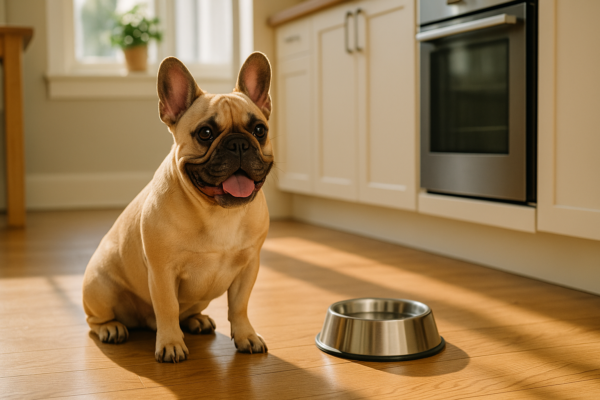
From understanding the nutritional components essential for their wellbeing to identifying top commercial dog food brands, this guide will provide insights into the best food for your Frenchie in 2025—and how to optimize your French Bulldog’s diet based on their unique health needs.
Summary of Best Dog Food for French Bulldogs
- Choose high-quality dog food tailored for small breeds with sensitive digestion.
- Monitor the daily food amount to prevent obesity and maintain a healthy French Bulldog physique.
- Prioritize whole food ingredients over processed dog foods.
- Consider raw food diets if guided by a professional.
- Ensure constant access to fresh food and water.
- Consult a veterinarian to find the right food that meets your Frenchie’s specific food requirements.
- Rotate proteins like grass-fed beef, cage-free chicken, and farm-raised duck to avoid intolerances—especially important if your dog is allergic to common proteins.
- Select treats made with the same standards as their meals—functional and easy to digest.
- Hydration matters—wet food options and adding water to kibble can support hydration levels, especially in warmer climates.
What Are the Dietary Needs of French Bulldogs?
Diet for French Bulldogs needs to account for their brachycephalic structure and tendency toward food sensitivities.
These compact and muscular dogs, with their bat-like ears and endearing expressions, are more likely than other dog breeds to experience respiratory challenges, which can impact their eating habits and overall digestion.
Because of these health dynamics, the French Bulldog’s diet must be nutrient-dense and highly digestible, ensuring they get the energy and nourishment they need without causing undue strain.
Choosing easy-to-chew and digest options—like wet food or specially formulated dry kibble—reduces the risk of choking and eases mealtime effort.
Key consideration: If your dog is eating quickly or showing signs of distress, consider using a slow feeder bowl alongside moistening their kibble or switching to wet food options for easier consumption.
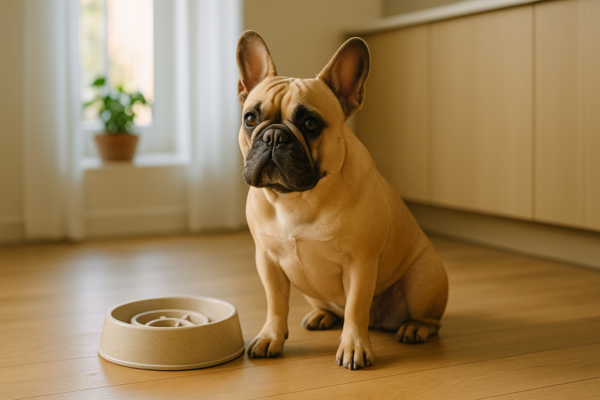
One thing I’ve consistently found in my experience is the importance of choosing foods that directly address these specific needs.
Meals that are not too tough to chew, yet still packed with nutrition, can make all the difference.
For example, French Bulldogs can eat premium protein sources that are easy to digest without compromising on quality.
If you’re searching for food for a French Bulldog, prioritize high-quality options that contain essential nutrients like omega fatty acids, glucosamine, and probiotics—key ingredients in a French Bulldog’s diet for promoting joint, skin, and digestive health.
Furthermore, French Bulldogs can have more difficulty breathing in extreme heat, so their food should be easy on their digestion to prevent them from overexerting themselves during meals.
Some dogs may struggle with food intolerances, so it is essential to find the right food that addresses their individual needs.
Look for brands that offer smaller kibble sizes and gentle formulations designed specifically for French Bulldog health.
Choosing the best food for French bulldog puppies early on can set the foundation for lifelong health.
Pro tip: Choosing the wet food for French Bulldogs in hotter climates helps prevent dehydration and reduces digestive strain.
French Bulldog needs are unique due to their structure and metabolism, so feeding them highly digestible meals designed for popular dog breeds with similar health concerns is key.
What Nutritional Components Are Essential?
| Nutrient | Purpose | Best Sources |
|---|---|---|
| Protein | Supports muscle mass | Grass-fed beef, Cage-free chicken |
| Omega-3 Fatty Acids | Promotes skin and coat health | Fish oil, Krill oil |
| Collagen & Glucosamine | Supports joint health | Collagen peptides, Glucosamine hydrochloride |
| Antioxidants | Boosts immune system | Blueberries, Cranberries, Reishi mushrooms |
| Calcium & Phosphorus | Strengthens bones | Bone meal, Leafy greens |
French Bulldogs require a balanced diet rich in proteins, healthy fats, vitamins, and minerals.
Key nutritional components include high-quality proteins to support muscle mass, fatty acids for maintaining skin and coat health, and carbohydrates for sustainable energy.
For a breed like the French Bulldog, which is more likely than other dog breeds to suffer from skin issues and allergies, ingredients that promote skin and coat health are essential.
For example, omega-3 fatty acids sourced from fish or krill oil can help nourish their skin, while collagen and glucosamine can provide support for their joints.
French Bulldog health relies on a diet that also promotes hydration and elasticity, often through whole food ingredients.
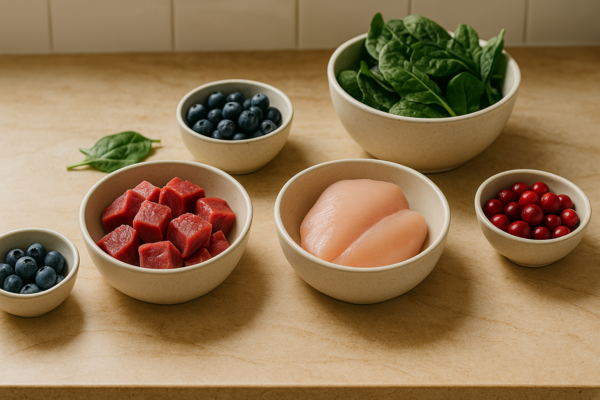
Additionally, foods for French Bulldogs should contain essential nutrients like calcium and phosphorus to support bone health, and antioxidants to boost their immune system.
It’s crucial to choose dog foods that list whole meats as the primary ingredient.
This ensures your Frenchie receives the highest quality nutrition with every bite.
For dogs with sensitive stomachs, dog food with easily digestible proteins, like grass-fed beef or farm-raised duck, can make mealtime more enjoyable and less stressful.
👉 Best practice: When a dog is allergic to common proteins like chicken or beef, rotating to farm-raised duck or lamb—key components in the French Bulldog’s diet—may reduce allergic responses and improve digestion.
How to Address Common Health Concerns in French Bulldogs?
French Bulldogs are prone to certain health issues, including food allergies, skin conditions, and digestive problems, often manifesting as a sensitive stomach.
To address these concerns, it’s important to choose dog food formulated to meet their specific needs.
Proper diets can be beneficial in managing food allergies and sensitivities, as they reduce the risk of adverse reactions.
Moreover, incorporating fresh food or the best raw food options can provide additional nutritional benefits while supporting overall health.
Always consult with a veterinarian to tailor a diet plan that addresses your French Bulldog’s unique health challenges.
In my own journey as a Frenchie parent, I’ve seen firsthand the difference that switching to a food rich in high-quality animal protein and low in fillers can make.
My Frenchie showed fewer signs of stomach upset after moving to a grain-free option like CHARM® Grass-Fed Beef Dry Food.
It can support dogs with sensitive stomachs while delivering the vital nutrients they need for overall health.
Why French Bulldogs Are Prone to Obesity and How to Prevent It
Why They Gain Weight Easily:
- Laid-back nature → Less active
- Brachycephalic syndrome → Breathing issues limit exercise
- Overfeeding & too many treats
How to Prevent It:
✅ Stick to a strict feeding schedule
✅ Use a food scale to measure portions
✅ Choose high-protein, low-carb foods
✅ Incorporate daily short walks & indoor play
✅ Choose wet food for added hydration & fullness
French Bulldogs, despite their small size, can be prone to obesity if not carefully monitored.
Their lovable, laid-back nature makes it easy for them to gain extra weight, which can lead to serious health issues like heart disease, joint problems, and breathing difficulties.
This is especially concerning for popular dog breeds like French Bulldogs, where excess weight exacerbates their brachycephalic airway syndrome.
Studies indicate that French Bulldogs tend to gain weight faster than other dog breeds, especially when their daily food intake isn’t strictly regulated.
👉 Best Practice: It’s best to select a balanced dry dog food that supports weight control.
Many premium food companies offer specialized formulations that help maintain lean muscle mass while minimizing unnecessary calories.
I learned this the hard way.
At one point, I noticed my Frenchie, Baxter, had gained weight.
I’d assumed he could just run off the extra calories by playing, but French Bulldogs tend to be less active than other dog breeds.
Without adjusting their diet, it’s easy for them to pack on pounds.
The key here is to maintain a strict feeding schedule and avoid overindulging them with treats, which can sneak extra calories into their diet.
I found that using a food scale to measure portions and avoid overfeeding worked wonders in keeping Baxter trim and healthy.
Also, incorporating regular, moderate exercise into their daily routine—like short walks or interactive indoor play—helps prevent the weight gain so common in this breed.
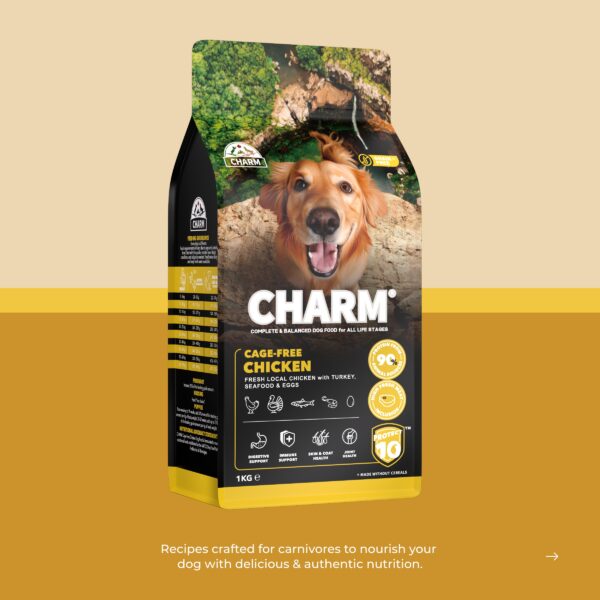
For owners wondering how to feed your dog to prevent obesity, choosing formulas that are high in lean protein and low in carbohydrates is essential.
Using a food like CHARM® Pet Food’s Cage-Free Chicken Dry Dog Food, which is low in carbohydrates and high in animal protein, can also help maintain a French Bulldog’s healthy weight.
This type of food contains balanced nutrients that support muscle retention and reduce unnecessary fat accumulation.
👉 Expert Tip: Portion control matters.
Always follow the feeding guide on the packaging and adjust portion accordingly.
Overfeeding, even with premium dry dog food, may lead to rapid weight gain, especially in French Bulldogs.
These formulas keep calories controlled while delivering all the necessary nutrients for muscle mass and energy.
Choosing the best food for your French Bulldog can help manage their weight while supporting their unique food requirements.
Some of the wet food options are also suitable for weight management, offering high moisture content to keep your Frenchie feeling full while reducing calorie intake.
The Importance of Hydration for French Bulldogs
Hydration is often overlooked when it comes to French Bulldogs, but it’s essential for their health.
I’ve realized that French Bulldogs can be prone to dehydration, especially during warmer months, as their short snouts make it harder for them to regulate body temperature.
This can lead to heat exhaustion—or worse—which is something I definitely don’t want for Baxter.
To encourage hydration, I’ve started adding water to his dry food, which he enjoys.
Additionally, providing fresh, clean water throughout the day and offering ice cubes as a treat can help keep them hydrated, especially during the hotter seasons.
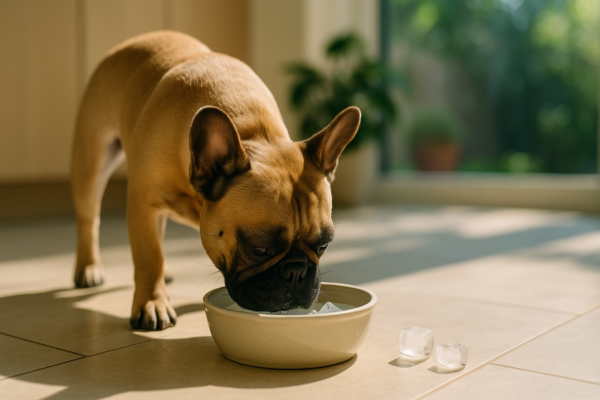
Monitoring your Frenchie’s water intake can help ensure they’re properly hydrated and protected from dehydration-related health issues.
If you’re concerned about hydration, opting for a wet dog food that’s high in water content—like CHARM® Grass-Fed Lamb Dry Food—could be a helpful addition to your Frenchie’s diet.
It’s an easy way to keep them hydrated while ensuring they receive a full range of nutrients.
Food and water should always be available, and adding moisture to meals can be ideal for French Bulldogs prone to dehydration.
French Bulldogs don’t always show obvious signs of thirst, which is why owners need to be proactive about encouraging water intake throughout the day.
How to Choose Treats That Are Safe for French Bulldogs
Treats can be a great way to bond with your French Bulldog and reward them for good behavior, but it’s important to choose the right ones.
Not all treats are created equal.
Some are high in fat or contain ingredients that can upset a Frenchie’s sensitive stomach.
I learned this lesson when I gave Baxter some rich treats and noticed he had stomach upset afterward.
Opt for treats that align with your dog’s food philosophy—high-quality animal protein, free from grains or fillers.
These are easier on their digestion and help maintain a healthy weight.
And when in doubt about a treat’s safety, consult your veterinarian.
Better safe than sorry when it comes to your dog’s health.
This is another reason I trust CHARM® Pet Food.
They include functional ingredients like turkey tail mushrooms and krill that support my Frenchie’s health and happiness.
How to Find the Best Dog Food for Your French Bulldog?
When searching for commercial dog food, it’s essential to prioritize quality and nutritional value.
The best dog food for Frenchies should contain premium ingredients, with an ideal balance of proteins, fats, and carbohydrates tailored for small breeds.
Look for dog food brands that offer complete and balanced nutrition, free from unnecessary fillers and artificial additives.
Additionally, consider options specifically formulated for small dogs.
Not all dog foods meet the unique dietary needs of French Bulldogs—key factors like kibble size, nutrient density, and ease of digestion are non-negotiable.
Choosing the best food for French Bulldog puppies early on helps ensure they develop strong bones, healthy skin, and a robust immune system.
Take CHARM® Pet Food’s Grass-Fed Beef Dry Food, for example.
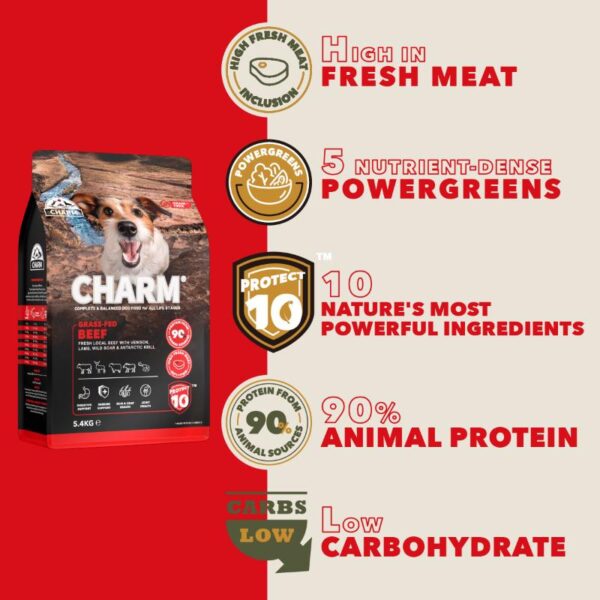
This product not only delivers high-quality protein but also incorporates functional ingredients designed to support healthy skin, joint health, and overall vitality in French Bulldogs.
This high-quality dog food is also ideal for French Bulldogs with sensitive stomachs, thanks to its limited ingredient formulation.
To further support your Frenchie’s health, opt for formulas that incorporate functional ingredients like reishi mushrooms, turkey tail mushrooms, and chaga mushrooms.
These ingredients promote immune function, joint health, and digestive balance, aligning with CHARM® Pet Food’s commitment to functional, purposeful nutrition.
Are There Specific Dog Food Brands Recommended for French Bulldogs?
When selecting a brand, always verify that it meets or exceeds the Association of American Feed Control Officials (AAFCO) standards for balanced nutrition.
But choosing the right brand is about more than regulatory compliance.
You need to consider ingredient sourcing, formulation philosophy, and how well the food aligns with your Frenchie’s specific health needs.
Dog food for your Frenchie should always prioritize whole food ingredients over processed dog foods, which often include unnecessary fillers and preservatives.
For instance, CHARM® Pet Food’s carefully selected ingredients make it an excellent choice for French Bulldogs.
Their Grass-Fed Beef Dry Food uses wholesome, fresh meat and purposeful functional ingredients that address common health challenges in French Bulldogs.
Its low glycemic index and grain-free formulation support digestion while delivering key nutrients, such as omega-3 fatty acids for skin and coat health.
French Bulldogs don’t always respond well to foods with artificial additives or fillers, so choosing brands that focus on transparency and quality sourcing is crucial for their long-term health.
How Important Is It to Choose Food Based on Life Stage?
Selecting dog food based on life stage is absolutely crucial for meeting the evolving nutritional requirements of your French Bulldog.
Puppies, adult dogs, and senior French Bulldogs all have distinct dietary needs.
Providing life stage-appropriate nutrition ensures they receive the right balance of protein, calories, vitamins, and minerals at each phase of life.
Puppy food, for instance, contains higher protein and calorie content to support growth and development.
Frenchie puppies require more calories and nutrients compared to adults, making it essential to determine the best puppy formula for their development.
Adult dog food focuses on maintaining health and energy levels, while senior dog food often emphasizes joint support and easier digestion.
For senior French Bulldogs, it’s essential to prioritize ingredients that promote joint health and maintain lean muscle mass.
CHARM® Pet Food’s Grass-Fed Lamb Dry Food is an excellent option, featuring glucosamine and chondroitin—two key nutrients that support aging joints.
As always, adjust the feeding amount of food based on your Frenchie’s age, weight, and activity level to prevent overfeeding or undernourishment.
Is Homemade Food a Good Option for French Bulldogs?
Homemade food can be a good option if your French Bulldog has shown sensitivities to commercial dog food or if you prefer more control over their diet.
Preparing meals at home allows you to use fresh, whole ingredients and customize food recipes that meet your Frenchie’s specific dietary needs.
This approach can be particularly beneficial for managing food allergies and ensuring balanced nutrition.
Homemade meals also offer a unique bonding opportunity—you know exactly what goes into your dog’s food, and that builds confidence and peace of mind.
However, it does come with challenges.
One common pitfall is overlooking nutrient balance.
It’s easy to assume you’re providing a healthy meal, but without the right mix of proteins, fats, and carbohydrates, nutritional deficiencies can develop.
That’s why I always recommend consulting with a pet nutritionist or veterinarian before switching to a homemade diet.
How to Ensure Homemade Meals Meet Nutritional Requirements?
To ensure that homemade meals meet the nutritional requirements of your French Bulldog, it’s critical to consult a veterinarian or pet nutritionist.
They’ll help you formulate a complete and balanced diet with appropriate levels of proteins, healthy fats, vitamins, and minerals.
This is especially important when feeding French Bulldogs that have food requirements beyond what commercial diets typically offer.
When preparing meals at home, avoid ingredients that don’t align with a French Bulldog’s dietary needs—such as grains, potatoes, or high glycemic ingredients like rice.
Instead, consider alternatives like lentils, chickpeas, or sweet potatoes.
These ingredients align with CHARM® Pet Food’s low-carb, grain-free philosophy and help stabilize blood sugar levels.
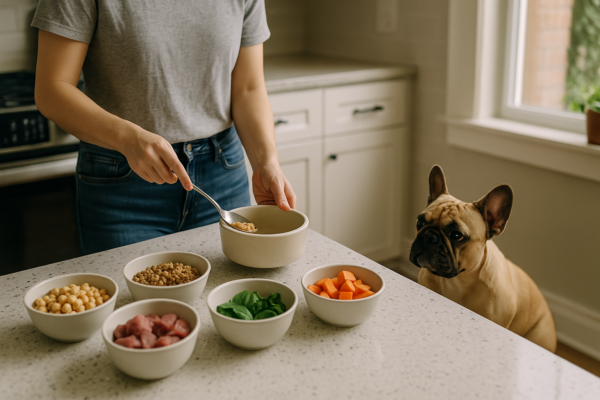
Additionally, using supplements may be necessary to address nutritional gaps.
For example, calcium supplements can support bone health, while omega-3 oils can enhance coat condition.
Careful meal planning and ongoing evaluation are essential for success.
Incorporating functional ingredients is another key factor.
For instance, adding reishi or turkey tail mushrooms to your Frenchie’s meals can offer antioxidant and immune-boosting benefits, consistent with the CHARM® Pet Food approach.
These superfoods help support a healthy immune system and maintain energy levels.
Also, be mindful of food texture and size.
Because French Bulldogs are brachycephalic, their meals should be easy to chew and digest.
Finely chopped meats or shredded ingredients work well.
Opt for gentle, digestible proteins like grass-fed beef or cage-free chicken to make meals enjoyable and safe.
Are There Any Risks Associated with Homemade Diets?
While homemade diets can offer numerous benefits, they also come with potential risks if not carefully managed.
One major concern is nutritional imbalance, which can lead to deficiencies or excesses of essential nutrients over time.
Additionally, preparing homemade food is time-intensive and requires a solid understanding of canine nutrition.
There’s also the risk of contamination, especially if raw food is not handled properly.
To minimize risks, follow veterinarian-approved recipes and implement strict hygiene practices when preparing meals.
Including a variety of ingredients can help create a more balanced and nutrient-rich diet for your French Bulldog.
Raw food diets are popular with some French Bulldog owners, but they require strict food safety protocols to avoid health risks.
That said, if homemade diets seem too complex or risky, high-quality commercial foods like CHARM® Pet Food are an excellent alternative.
They offer carefully formulated recipes with balanced nutrition, functional ingredients, and thoughtful sourcing—taking the guesswork out of feeding your Frenchie.
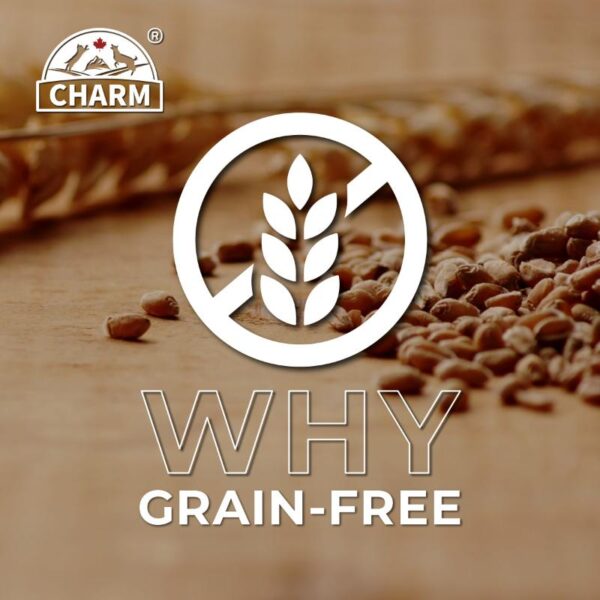
How to Manage a Sensitive Stomach in French Bulldogs?
For French Bulldogs with sensitive stomachs, avoiding common digestive triggers is crucial.
Ingredients such as artificial preservatives, fillers, corn, wheat, and soy are often culprits behind digestive upset.
Some Frenchies are sensitive to specific proteins, so monitoring their reactions when introducing new foods is important.
In my own experience, switching to a grain-free, low-glycemic diet made a huge difference.
Even seemingly healthy grains like brown rice or oatmeal didn’t sit well with my Frenchie.
That’s why I always recommend grain-free, low-carb options tailored to digestive health.
Dog food made for sensitive stomachs often includes easily digestible proteins and limited ingredient lists to reduce the likelihood of adverse reactions.
CHARM® Pet Food’s formulas, like their Farm-Raised Duck Dry Food, are great for sensitive stomachs.
They avoid common irritants like grains, potatoes, and artificial preservatives.
Instead, they include functional ingredients like pineapple, artichoke hearts, and spinach, which support a healthy gut microbiome and improve digestion.
What Ingredients Should Be Avoided?
Avoid ingredients like soy, by-products, artificial flavorings, and synthetic colorings.
These offer no nutritional value and can cause irritation or trigger sensitivities.
I’ve seen dogs experience bloating, loose stools, and skin reactions simply from soy-based fillers.
Processed dog foods often include these problematic additives, which is why choosing minimally processed options is ideal for French Bulldogs.
If your French Bulldog struggles with common proteins like chicken or beef, consider novel proteins like lamb or duck.
CHARM® Pet Food’s Grass-Fed Lamb Dry Food is an excellent example—providing a highly digestible, novel protein source that’s gentle on the stomach.
The best dog food for Frenchies often contains unique proteins and functional ingredients that support healthy digestion and skin.
Additionally, look for dog food with functional ingredients that offer health benefits beyond basic nutrition.
For example, blueberries, cranberries, green kiwifruit, chaga mushrooms, reishi mushrooms, and turkey tail mushrooms deliver antioxidant support and promote gut health.
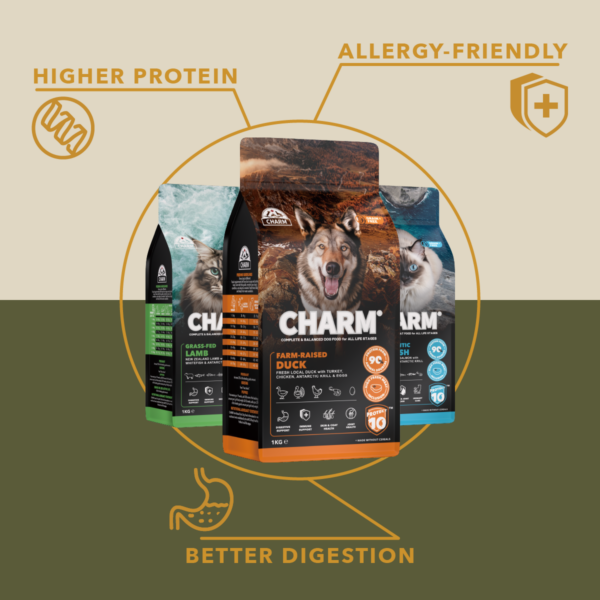
When to Consider Consulting a Veterinarian?
If your French Bulldog consistently experiences digestive issues or food sensitivities, consult a veterinarian.
Persistent symptoms like vomiting, diarrhea, or appetite changes may signal underlying health problems that need professional attention.
A veterinarian can run diagnostic tests to identify allergies, intolerances, or other conditions and create a tailored dietary plan.
In many cases, vets recommend elimination diets to pinpoint the exact triggers.
This was the case with my Frenchie, Baxter.
After working closely with our vet, we discovered that a lamb-based diet worked best for him.
With clear guidance from a veterinarian, you can confidently select foods that meet your dog’s specific needs.
Often, they’ll suggest switching to grain-free, high-protein diets like CHARM® Pet Food’s Grass-Fed Lamb or Farm-Raised Duck Dry Food, both of which are formulated without common irritants and focus on animal protein sources that are easier to digest.
These diets are ideal for French Bulldogs with food requirements that differ from other breeds, particularly those with sensitivities.
And don’t forget—your vet may also recommend probiotics or digestive enzymes to complement your Frenchie’s diet.
Although CHARM® Pet Food includes functional ingredients that promote gut health, additional supplementation can be beneficial for dogs with chronic digestive sensitivities.
Final Thoughts on Feeding Your French Bulldog
Feeding a French Bulldog is about more than just filling a bowl.
It’s about understanding their unique physical traits, dietary sensitivities, and health challenges—and providing them with optimal nutrition to support a long, healthy, and happy life.
Whether you choose high-quality commercial food or prepare homemade meals, focus on premium, functional ingredients that support their overall wellbeing.
The best food for your French Bulldog should combine whole food ingredients with essential nutrients tailored to their specific health requirements.
With CHARM® Pet Food’s commitment to wholesome meats, carefully selected functional ingredients, and a low-carb, grain-free philosophy, you can feel confident you’re giving your French Bulldog the very best.
Their Grass-Fed Beef and Cage-Free Chicken formulas offer targeted nutrition that meets the unique dietary needs of French Bulldogs.
These high-quality dog food options are also ideal for French Bulldogs with sensitive stomachs, providing nourishment without upsetting their delicate digestive systems.
By avoiding grains, potatoes, and high glycemic ingredients, and emphasizing functional ingredients such as turkey tail mushrooms, reishi mushrooms, and krill, you reinforce your Frenchie’s health and well-being with every meal.
Additionally, it’s essential to monitor the amount of food you feed your Frenchie.
Overfeeding can quickly lead to obesity, while underfeeding can result in nutritional deficiencies.
Using a feeding guide or consulting your veterinarian ensures you’re providing the right portion sizes based on your dog’s age, weight, and activity level.
If you’re ever unsure about which dog food for your Frenchie is best, consult your veterinarian or a pet nutrition expert.
Choosing the best food for your French Bulldog may take a little time and research, but the long-term benefits are worth it.
From managing sensitive stomachs to promoting healthy skin and maintaining ideal weight, finding the right diet plays a crucial role in your Frenchie’s quality of life.
Bonus: Creating a Feeding Plan That Works for Every Dog (Including French Bulldogs)
Creating a personalized feeding plan is one of the best ways to ensure your French Bulldog stays healthy and happy.
But this isn’t just important for Frenchies—it’s essential for every dog, regardless of breed.
Start by identifying your dog’s nutritional needs based on their age, weight, activity level, and any health concerns.
Puppies, adults, and seniors have different dietary requirements.
For instance, adult food formulations focus on maintaining healthy energy levels and supporting lean muscle mass, while puppy formulas prioritize growth and development.
For French Bulldogs specifically, a feeding plan should factor in their propensity for weight gain and sensitive digestion.
Choosing the best food often means selecting limited ingredient or grain-free options with high-quality proteins and healthy fats.
This approach minimizes the risk of allergic reactions and digestive upset.
Be consistent with feeding times and avoid free-feeding.
Controlled portions prevent overeating and help regulate digestion.
Measuring the amount of food precisely—whether it’s dry kibble, wet food, or homemade meals—keeps your Frenchie at an ideal weight.
And don’t forget about hydration!
Food and water go hand in hand, especially for breeds like French Bulldogs that are prone to overheating.
Incorporating wet foods or adding water to kibble can help maintain hydration levels.
Here is article for German Shepherd Food.
Frequently Asked Questions: Finding the Right Dog Food for French Bulldogs
Q1: How do I determine the best food for my French Bulldog?
A1: Start by evaluating their specific health needs. Are they prone to allergies or sensitive stomachs? Look for high-quality dog food brands that offer high animal protein and low-carb recipes. Finding the best food often involves a bit of trial and error—monitor how they respond to different proteins and formulations.
Q2: What should I avoid when selecting food for my French Bulldog?
A2: Avoid processed dog foods that include fillers like corn, wheat, or soy. These can contribute to digestive issues and skin conditions. Instead, opt for dog food made with whole food ingredients and free from artificial additives.
Q3: Is a raw food diet suitable for French Bulldogs?
A3: Raw food diets can be beneficial for some French Bulldogs, especially those with severe food sensitivities. However, they require careful preparation and consultation with a veterinarian to avoid nutritional imbalances and food safety risks.
Q4: How often should I feed my French Bulldog?
A4: Most adult French Bulldogs do well with two meals a day. Puppies may require more frequent feeding. Always refer to the feeding guide on your chosen dog food packaging and consult your vet to adjust the amount of food as needed.

Final Takeaway: Your Frenchie Deserves the Best
French Bulldogs have captured the hearts of dog lovers worldwide, but their unique health needs require an equally unique nutritional strategy.
Whether you’re raising Frenchie puppies, maintaining a healthy adult food plan, or supporting a senior’s aging joints, your choice of food plays a pivotal role.
Don’t settle for the average—opt for the best food for French Bulldogs, crafted with care and science-backed ingredients.
Whether that’s a premium dog food for your Frenchie or a well-planned homemade recipe, your commitment to their health will be rewarded with years of companionship, joy, and tail wags.



